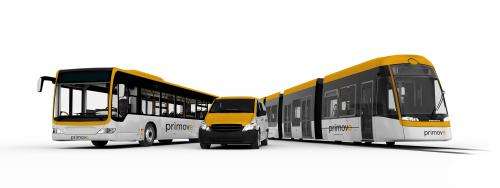(Phys.org)—Canadian company Bombardier, Inc's rail division based in Berlin Germany, has announced the approval of a test run of an all electric bus recharging system in the city of Mannheim. The power systems are based on the company's PRIMOVE Technology, whereby vehicles are charged inductively while pausing to load and unload passengers. The primary purpose of the test-run is to determine whether such a system is viable in a real-world environment.
Plans call for two Swiss built busses (Carrosserie HESS AG) to be retrofitted with the PRIMOVE Technology—streets will be dug up at bus stops to embed the other half of the technology beneath the road bed. Once installed, an initial test run of the system will commence to ensure all of the parts are working correctly. Once that is completed, the two busses will run their normal bus routes (with passengers) for 12 months, during which time researchers from the Karlsruhe Institute of Technology will be analyzing data from the system to monitor, tweak and build a knowledge base of information to be used in building future test sites to optimize the system overall.
An inductive charging system is wireless; current is passed through the air—in this case from beneath the roadbed to components installed in the undercarriage of a bus. For such a charging system to work as part of a bus line, the right size batteries must be used. Ideally, small batters can be employed as they will be given frequent charges—this allows for increased efficiency due to a lighter battery load. The batteries must be just large enough to ensure a bus can complete its route each day without ever having to stop for just recharging purposes. In addition to providing a city with zero emissions (at the point of use), electric busses also reduce noise pollution. As part of testing the system, researchers will also be speaking directly with passengers to get their ideas on how well the busses work within the system.
The German government has stated its intent to pursue electric technology for busses in the country and has backed up that pledge by offering funds to various projects. For this test, the country's Federal Ministry of Transport, Building and Urban Development will be footing the bill to the tune of €3.3 million (US$4.35 million).
More information:
www.bombardier.com/en/corporat … cID=0901260d80299a7d
primove.bombardier.com/
© 2013 Phys.org
























